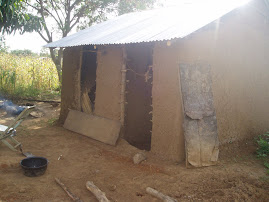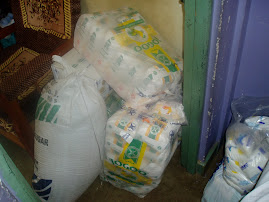“Who do you think would win as President of the
United States,” I ask, “Arnold Schwarzenegger or Rambo?”
Austine and George laugh.
“I would have to go with
Arnold, because he’s already Governor” says Austine.
What had started as a playful but riveting political discussion about the current American primaries, had somehow gotten off-topic when Austine asked why movie stars always became political figures in the
U.S. Austine and I taught at the same school my first year in Kenya, and he and George are two of the Deaf teachers I’m working with this time around
.
Satisfied with our three hours of work, we started in on Arnold, I informed them about President Reagan’s past cinematic fame, and then George, in his dry, deadpan humor said, “Okay, now where’s Rambo?”
I don’t know what’s been a more interesting discussion with Kenyans, talking about the recent political situation in Kenya, or the current political situation in America. Obama is a local hero in these parts because his father’s home is “just there” in Siaya. Siaya is actually a good two hours away by public transportation, but if you’re from the same tribe and live in the same province in Kenya, the guy in the town four hours away might as well be your brother.
“Obama is my cousin.” George said with a completely straight face.
On the surface, Kenya shows the illusion of being a content, functioning African country. Life seems to run with complete normalcy, barring an increase in food and transportation costs. I have absolutely no concerns about my safety, but I’m able to feel the buzz of tension below the surface of every look, action, and conversation. I drive past “Adhiambo’s* hair salon” in Nairobi, which stands open but empty, and I wonder if Adhiambo is still there, and what she had to go through to remain. I hear numerous accounts of children whose homes were burned along with all their belongings, and the thousands of people who are still afraid to go back to their homes. The principal at this school told me how she and a group of about 20 students couldn't leave the school for several weeks, because of the instability outside. When a policeman came to the gate at one point, she and other school staff hid the children in a back classroom and locked the door. The principal said, “You never know with the police. They could just start shooting.”
She says the violence has caused so much mistrust throughout the country. Two good friends from different tribes could be having a smiling, civil conversation. But below the surface they are suspicious, and very angry, and they don’t talk about it. I’ve encountered this obvious anger and sadness in the Kenyans I’ve spoken with, but I’ve also noticed their pride for the fact that their country stood up for what they believed in, and in true Kenyan fashion, the humor underneath it all. Austine, George and I talked about the seriousness of the civil unrest and it’s aftermath for a long time. How the disruption of this African island of civility and relative peace for 40-odd years have opened Kenyan’s eyes to the possibility of what the country could be – and should be. How we hope that Kofi Annan gets the recognition he deserves. But we also laughed at how Condoleeza Rice berated Kenya for its behavior – from the faraway safety of Tanzania. We laughed about Moi**, who calmly stayed in his home and chanted his support for Kibaki and continued to do so after Kibaki “won” the election, until Raila supporters started throwing rocks at his house. Moi lost absolutely no time in flying off to the safety of South Africa. In which his neighbors lost absolutely no time in breaking down his gate and stealing all of his cows, slaughtering some right on Moi’s lawn and cutting them into pieces to share around the area. Moi came back when the unrest had settled, to an empty lawn, and neighbors who had a good thing to say about him for once. Or at least they had a good thing to say about his cows.
The story that had us holding our sides was from Kisumu. At the height of the unrest after the election, when buildings were razed to the ground and a curfew was imposed, a mzungu*** and his young son were seen riding their bicycles down the center street of Kisumu. They were talking, laughing, and enjoying the day as if they were off to a picnic in the English countryside. Every Kenyan stopped what they were doing to stare with their mouths hanging open as the two of them passed on their bikes. The spectators were too shocked to even whisper the obligatory call of “mzungu” to the seemingly oblivious parties, who couldn’t have been more incongruous to their surroundings. After navigating the roundabout at the end of the road, the pair parked their bicycles in front of a large poster of Raila Odinga. They stood in front of the poster and father imparted his wisdom, supposedly about the recent election, in true museum quality, as if describing the intricacies of a rare Da Vinci. Once finished, father and son mounted their bicycles and rode down the street out of site, leaving hundreds of Kenyans staring at their wake, and at each other with blank wonder, as if they’d all witnessed the exact same apparition. As our laughter began to subside at the end of Austine’s story, I wondered aloud about the stupidity of this man, and why he couldn’t enlighten his son in a more stable area, like their home, or hotel room. Austine giggled, and said, “True, but the Kenyans aren’t going to bother the mzungu visitors, they’re not interested in hurting them.” His smile disappeared and a shadow crossed over his eyes. “Because this is not their home.”
Africa is like a second skin that's so easy to crawl back into each time you return. In the taxi from the airport, we listened to a 90’s love ballad by an unspecific boy band, a bad version of an 80’s power ballad, and then Celine Dion came on. “Now I know I’m back in Africa,” I said to my riding companions. We were late for our flight from Nairobi to Kisumu because the taxi drivers here tend to ride on empty and stop at a gas station on the way to your destination. At the pump you give him a piece of his fare which he uses to add just enough fuel to allow him to pick up someone else and stop at the gas station on their fare. I’ve had six cups of chai since yesterday which has given me a constant caffeine buzz, and when I got up this morning, I took a bath in a bucket on a cement floor, and then swept (yes, swept) the remaining water out of a tiny hole leading to the grass outside with a broom made of pieces of thick straw tied together on one end with a long piece of black rubber. It’s surprisingly effective. These little African idiosyncrasies make me forget the hideous travel time and jetlag, and wonder why I waited so long in between visits. It also gives me the hope that in this country, anything is possible.
Since my return from Jamaica was so recent, I had expected to compare everything in Kenya to Jamaica, which is what happened in reverse when I first arrived in the Caribbean. Although I truly love Jamaica and all of it’s outstanding qualities, hospitality is generally not one of them. It took me living there and returning here to realize how truly astounding Kenyan hospitality is. People I barely know cook and serve me remarkable meals (which I’m led to and sternly but graciously forced to eat as though I’m a head of cattle), because there is minimal or no running water at this school, they bring buckets of water for me and a stool (“how can you bathe without a stool, when your bucket is just on the ground?!”) and spend hours of their precious time visiting and talking with me so that I’m comfortable. After being with people constantly in the last day, Austine left my house after a visit, claiming he was doing something and coming right back. He walked out the door, and I was forced to reassure him when he immediately poked his head back in looking concerned and asked, “If you’re alone, are you bored?”
Tonight, the rain beats down on the tin roof so hard it drowns out my music and all sounds from outside. I’ve just finished a meal big enough for three people of scrambled eggs with tomato, sukuma, and ugali. I’ve revisited the joys of boiling my water and squatting above a hole in the ground to use the toilet. The electricity has just gone out, which cuts my writing short and squelches any chance of watching a movie with my friends on my laptop tonight – a rare, rare treat for them. I put “candles” on the mental list of things I need to buy in Kisumu tomorrow, and feel the excitement and apprehension of seeing my favorite city in Kenya, and what has happened to it. I sit in the pitch darkness and realize, despite the fact that I have no idea where my flashlight is packed, that I’m so happy to finally be here.
Happy Easter
* Adhiambo is a common Luo name for a woman. Although Nairobi is home for people from every tribe, there is a large population of Kikuyu people there. Many Luos have been forced from their homes and killed in parts of Nairobi. The Luos have done the same thing to the Kikuyus in Kisumu. There are still 300,000 people in displacement camps around the country who are either afraid to go back to their homes, or have no home to return to.
** Former President Daniel Arap Moi was President of Kenya for decades until 2002 when he retired and Kibaki began his first term as President. President Moi was suspected of “altering” the results of many of his elections, and is also one of the top 10 richest men in the world, in charge of one of the poorest countries in the world.
*** White person


